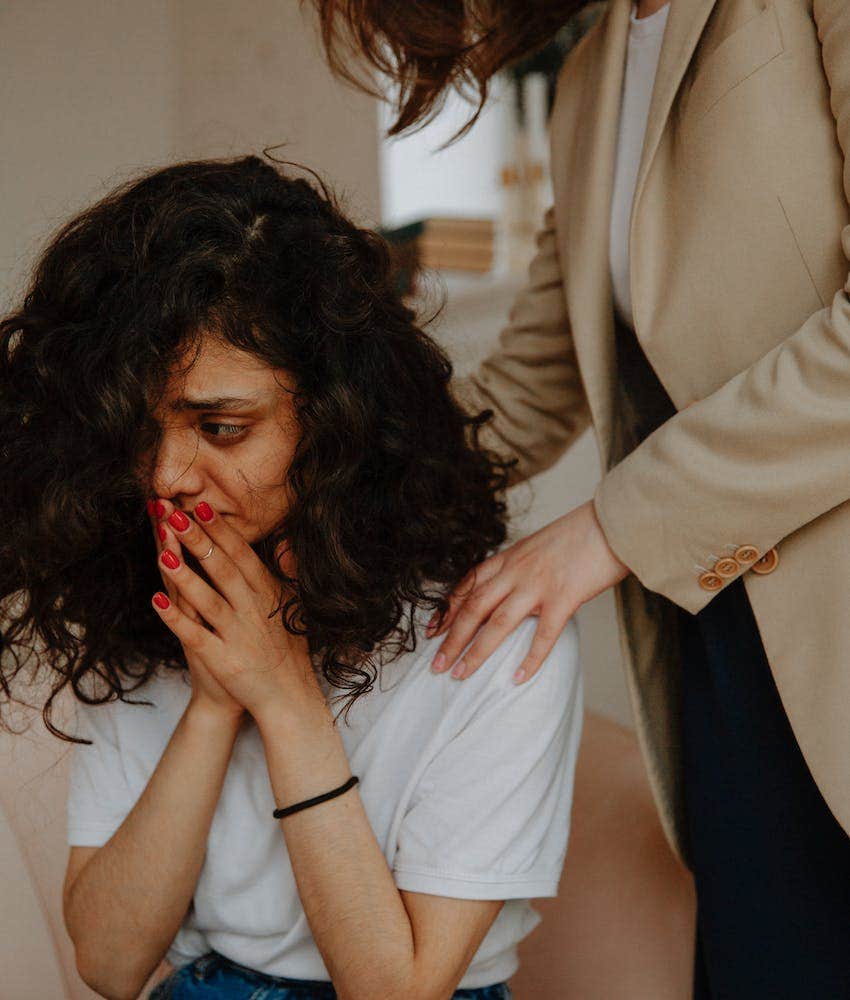21 People With Difficult Childhoods Share Something They Do Now That Is A Direct Result Of Their Trauma
You're never alone, even if you've gone through trauma.
 Timur Weber / Pexels
Timur Weber / Pexels A thread on Reddit, that was also shared on TikTok, asked a serious question to the forum’s followers regarding how people’s traumatic childhood experiences manifested in adulthood.
A child’s sense of safety depends on how safe their caregivers are. Traumatic moments in childhood can be complex and prolonged, or acute and instantaneous. No matter how a child experiences trauma while growing up, they’ll likely carry some aspect of it into adulthood.
21 people with difficult childhoods shared things they do now that are a direct result of living with trauma.
1. Second guessing and asking for permission
Both of these behaviors can stem from childhood trauma. One person shared that their trauma manifested in adulthood as not trusting their own intuition. They explained the need to constantly “[ask] for permission to do literally anything, double-checking that I was doing the right thing, and always second guessing myself, like to an abnormal level.”
2. Being ‘toxically independent’
Another way trauma can express itself is having trouble trusting others and feeling trepidation about relying on others to have your needs met.
 Photo: cottonbro studio / Pexels
Photo: cottonbro studio / Pexels
“I have an extremely hard time asking for help because I’ve never had it,” said someone on the thread.
3. Putting other people's needs first
“I do not prioritize myself, be it in health, time, or necessities,” someone else shared. “Everyone else in my life is ahead of me in the queue” for being cared for. Sometimes, being overly helpful can be harmful, as this person explained.
“Being helpful allows me to be present without being a target. Being helpful allows me to avoid my own problems because I’m too busy helping everyone else with theirs,” they said. “Being helpful allows me to feel valuable instead of expendable.”
4. Being overly apologetic
Saying sorry for taking up space can be a sign that you weren’t allowed to do so in childhood, and rewiring that part of your brain that lets you know you’re enough, can be really challenging work.
5. Being hyper-aware of your surroundings
One person described how being constantly on edge due to childhood trauma made them hypervigilant in adulthood. They said, “I listen for footsteps, doors opening and closing, people’s voices, water running in the pipes, cars pulling into the driveway, on and on.” They explained being super-alert as a coping mechanism, saying, “As a kid, I needed to know who was in my house and what they were doing.”
Their experience highlighted how patterns we develop as kids to protect ourselves can become harmful to us later on in life. Resetting our nervous systems is never easy, but with professional guidance, it can be done, giving us a life of greater ease and a sense of feeling safe.
6. Always being prepared for the worst-case scenario
One way of dealing with trauma can be to always expect something bad to happen. This plays into the feeling of hypervigilance and lack of control of your own surroundings.
As one person shared, they’re always “overthinking [and] predicting for and preparing for worst-case scenarios. Being stuck in a fight-or-flight reaction can wreak havoc on your sense of safety and general well-being.
7. Feeling like an inconvenience
Someone else discussed another interplay of childhood trauma and taking up space: The sense that they’re an inconvenience to others, which leads them to apologize for just being present.
8. Being overly affected by others' emotions
Being empathetic is usually a good trait to have, but if you find that you’re in tune with other people’s emotions in a way that makes it hard to regulate your own emotions, that can be a sign of trauma that’s carried over from childhood into adulthood.
 Photo: Polina Zimmerman / Pexels
Photo: Polina Zimmerman / Pexels
“Being hyper-aware of anyone experiencing negative emotions” is one way that people can have residual trauma. This feeling ties into being the peacekeeper; as one person described, “feeling someone else’s anger or depression very severely and feeling as though I have to be the one to calm things down and keep the peace.”
9. Having heightened responses to difficult situations
Feeling stuck in a loop of fight-flight-freeze-fawn response can be a sign of leftover trauma. Someone explained that they have a major “adrenaline dump at the slightest hint of conflict.”
Our bodies store our memories. It’s totally common for trauma to live in our physical responses, yet there exist certain healing modalities, like somatic therapies, that can help ease people’s pain and discomfort.
10. Difficulty accepting love at face value
A 54-year-old man shared, “I always have it in the back of my mind that anyone that says they love me has an ulterior motive.”
As sad as this is, it’s fairly common, especially for people who were taught that love is a finite resource, and a conditional one, at that.
11. Being a people-pleaser
“I people-please at all times,” said another person. “I thought I was kind but I’m actually trying to be as agreeable as possible out of fear.”
12. Over-justifying every decision
One person shared that they grew up having to explain themselves thoroughly to be seen as valid, saying, “If I didn’t explain things as far as being absent, feeling sick, or needing to go to the doctor, if I didn’t have a good enough explanation, I was completely disregarded.”
13. Experiencing insecure or anxious attachment
Another person revealed that their trauma led them to become “overly attached to people way [too] quickly, which usually pushes them away and just destroys me over and over again.”
Finding ways to feel securely attached is a skill that can be learned through professional guidance and mental health support.
14. Having a hard time hearing criticism
If you were harshly judged as a child, it’s entirely possible that taking constructive critique, even when it’s offered in a gentle and supportive way, can feel like a major struggle. One person shared that they felt major self-doubt and a need for constant outside affirmation as a result of their trauma.
“I find it difficult to have patience with myself while I struggle to learn [or] pick up new things,” they explained.
15. Having a self-deprecating sense of humor
Being able to laugh at ourselves is a skill, but having a darkly self-deprecating sense of humor can be a sign of residual trauma, as though you’re trying to tease yourself before others can hurt you.
As one person said, “I realized recently that a lot of the cruel things that were said to me have embedded themselves into my regular vocabulary under the guise of ‘self-deprecating humor.’”
Being gentle with ourselves isn’t easy, especially in the wake of generational trauma, but we can all try to speak to ourselves the way we’d speak to people we love, and offer ourselves grace to be imperfect.
16. Being easily startled.
A major sign of holding trauma is feeling on edge or uneasy, like something bad is always about to happen, because your body is trained to expect the worst.
17. Hating physical touch.
One person reflected on how hard it was for them to accept affection, noting, “After much contemplation, I realized I didn’t trust anyone enough to make myself vulnerable, even for a hug.”
 Photo: Karolina Grabowska / Pexels
Photo: Karolina Grabowska / Pexels
18. Having a hard time accepting failure
People carrying trauma can feel like they have to be perfect and infallible in order to avoid harsh and often emotionally or physically abusive responses from the adults in their lives.
19. Lying by default
One person shared that they worry they’ve become a pathological liar as a way to protect themselves.
“I can’t seem to stop,” they revealed. “I fear the damage is becoming irreversible.”
People with trauma often develop maladaptive coping strategies, techniques that help at the moment but can cause harm in the long run. Recognizing the existence of these habits is the first step to understanding them and changing them for the better.
20. Being very quiet
“I move very quietly,” said someone else. “That’s a skill you learn when you grow up not wanting to be seen or heard.”
21. Having trouble understanding verbal cues
“Language is full of tripwires for me,” explained one person. “I cannot tolerate vagueness, because it has been used against me so much.”
Open, direct communication can be a challenge for most people, yet for people with trauma, it can be extra difficult to interpret what people say and the meanings behind their words.
These shared realizations highlight that people who’ve gone through trauma are never alone, even if it feels like they are.
Healing trauma is a lifelong journey, yet it’s distinctly possible to do, especially by giving voice to the challenges trauma brings.
Alexandra Blogier is a writer on YourTango's news and entertainment team. She covers mental health, pop culture topics, and all things to do with the entertainment industry.
